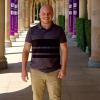High-performance aerodynamics and aeroacoustics simulations of the new generation of high-speed gas turbines via high-order Galerkin methods
Objective:
The main goal of this project is to perform efficient and accurate simulations of the turbulent compressible flow and generated noise on the new high-speed gas turbines at operation conditions, with the aim of supporting engineers in the design of efficient engines and effective noise reduction solutions. The main difficulty is to correctly simulate, in an acceptable wall- clock time, high Reynolds and high Mach numbers turbulent flows with important regions of separation and the different length scales and amplitudes among the acoustic and the flow fields.In this project we propose to tackle these problems by introducing high-order Galerkin methods and a skin friction boundary condition technique extended to compressible flows. Both techniques demonstrated impressive performance results on a different context. Given the fellow’s expertise in compressible flows, and her Third Country host’s expertise in high-order Galerkin methods, we are in a unique position to advance in the solution of this problem. A high performance computing simulation tool developed at the host institution will be used and developed as open source within this project. To go one step further within this interdisciplinary subject, we will establish a close collaboration with CTA, a company in the host country specialized in testing aerospace materials, where the fellow will spend one month of research. During this visit, the simulation results of their turbine prototypes will be analyzed and will be validated against their experimental data. The fellow will extend her network in the scientific and industrial communities. She will gain new managerial skills and a scientific maturity that will open her doors to obtain a strong research position in Europe. The host and the Third Country host supervisors will also benefit from the advances of this promising collaboration. The obtained results are expected to lead to further research and enhance the prospects of new projects.


